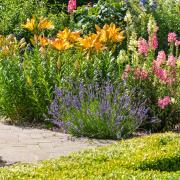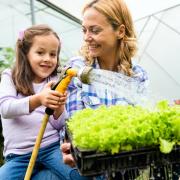Early May in the Somerset countryside, and the market garden at Homeacres is already promising a rich harvest. Neat, sun-washed rows of vegetables and salad spring from the beds that surround attractive greenhouses and tidy polytunnels. Bees bumble about their vital work, and the garden’s hedges are alive with birds. Their aerial view of the garden shows an abundant and colourful patchwork. And that is only to be expected, because this is the garden of Charles Dowding, organic gardener extraordinaire and proponent of the sublimely wonderful and entirely common-sense method of ‘no-dig’ gardening.
Charles has been following this ‘clean’ method of growing for more than 40 years, although he came from rather different roots.
‘I grew up on the family farm in Somerset, and on the farm everything was ‘normal’ for those days,’ he tells me. ‘There was some use of weed killers and pesticides and lots of artificial fertiliser. I never questioned any of the farming practices then.’ But suddenly something changed. Charles describes how, as a Cambridge undergraduate in 1979, he had an epiphany when a friend gave him a book to read called Animal Rights. ‘After reading the book I became vegetarian overnight, which was unusual back then. My father called me a rabbit! Then I got interested in nutrition, just thinking about food more – actually thinking! It made me delve deeper and deeper into how food is produced, and how it can be more healthy – and then we can be more healthy as a result. ‘This echoes the work of Eve Balfour who founded the Soil Association in 1946,’ Charles continues. ‘She wrote that health can be as infectious as disease, the point being that health is a positive state, and not just absence of disease. Nowadays it’s almost taken for granted that all we need to do is to avoid disease in order to be healthy, but I consider that to be only a starting point.’

Charles describes how the foundation for good health starts with healthy soil, the health of which then extends to the plants that grow in it, and thence to the people and animals that eat what grows. Back in the eighties Charles was seriously ahead of the curve. ‘When I started, there was little interest in organic growing and people thought I was a crazy hippie!’ But he admits that being a middle-class male gave him credibility and ‘people began to take what I said seriously – sometimes! ‘I gave talks in the 1980s to gardening clubs and then it was always about organic growing and that you really didn’t need pesticides and fertilisers. Back then few people were interested in soil, so I never talked about the no-dig system, even though I’ve been doing that since 1983. It’s only in the last 15 years that soil has become a thing, and now everybody wants to know about it,’ he says, which sounds quite heartening. ‘Also,’ he continues, ‘it links to climate change as no-dig is brilliant for keeping carbon in the soil. No-till is also a basic tenet of good farming. Carbon in the soil is the building block of all the healthy life processes; it’s food for all the soil organisms and in return it’s indirectly food for plants.’
There are numerous reasons why Charles feels that all of us who grow food can benefit from the no-dig approach. ‘Life in the soil is not harmed and so it continues working nicely and plants grow more healthily,’ he says. ‘You have bigger harvests, even with the same amount of inputs. I run trials in my garden which show that with no-dig you get 12% more food from the same amount of compost added.’ Charles explains that, as well as sequestering carbon, undug soil drains better in wet weather, holds warmth, and retains moisture more effectively in dry weather. Undisturbed mycelial structures in the soil bring more moisture to roots, so less manual watering is required. It also retains vital organic matter and ‘you can pop in seeds and plants at any time, with no mud ‘It also grows fewer weeds, which is another really big reason to adopt no-dig,’ he adds. ‘The end result is that you save so much time. None of us have enough time to do everything and this is such a big reason to go no-dig: you need less time for a better result. The whole world needs to look at this!’

Indeed, many places of the world are indeed looking at it: when I first contacted Charles he was in Chile, running fully subscribed courses in different parts of the country, delivering his knowledge to so many who are keen to learn. He is also running courses this year in Spain and Ireland. On a large, farm scale, an advantage of the no-dig method is that it reduces soil erosion. Most of us only have a small area of garden or allotment in which to grow our veg, but these small areas become part of a much bigger, healthier whole.‘For any beginner,’ says Charles, ‘my top advice is to start with just a small area. This is partly because I recommend using a large amount of compost just for starting out, perhaps four or five inches deep, but this is not something you do every year after that.‘You will then reap a big harvest because the soil so quickly becomes fertile. This also means you don’t need a big area. For example, full size allotments are often too big for starter gardeners.’ Charles says that after the first year the annual input of compost required is merely an inch deep and this can be any decent compost, such as animal manure, mushroom compost or the green-waste compost which can be bought. And we can, of course, make our own compost, something I myself find inordinately satisfying. ‘Although make sure it’s not too fresh,’ Charles adds, ‘and it must be cool when you use it.’ Charles’ latest book on making compost comes out this September. Once the compost is applied, magical earthworms do the work for us, taking the organic matter into the soil where organisms convert it to plant food – and the never-ending cycle continues.There is much in the news about the need to feed an ever-growing human population. With its increased yields and gentler touch on the planet, this method of production, working in harmony with Nature, is a lovely way to grow. It is part of the Big Solution. And there we have it: a no-brain method that is good for the Earth and all life on it. So, lock the spades away in the potting shed and stop digging. It is, quite simply, the right thing to do.

MAKING THE TRANSITION
The no-dig method is not difficult. It is also very cost-effective: the annual purchase of garden products is small as you don’t need to use any fertilisers or pesticides.
Charles has written numerous books on the methods he uses and his website is full of resources and guidance on how to get going. It includes such topics as sowing times, propagation, compost-making and what to do about slugs – who can be regarded as part of the waste-recycling process.
His YouTube channel shows videos giving practical advice, and top of the list are the delicious courses he runs at Homeacres, in South Somerset, where we can all get our hands on the soil (not in it) and learn alongside the guru. Go for it!
charlesdowding.co.uk



























